
I’ve had the opportunity to speak with a number of startups during my career, and I have helped several with digital marketing strategy. If you’ve worked with startups before, you know how inherently fast-paced, exciting, and challenging they can be. The fact of the matter is that startups are facing an uphill battle that most will never win. As a brand new company with a new product or service, with no brand recognition and no customers, startups are in an incredibly challenging position, to say the least.
From a marketing perspective, many startups have a hard time with SEO and inbound marketing in general. It makes sense when you break down everything involved in building SEO strength from scratch. SEO requires resources, time, and patience, and, as you can guess, those three items aren’t found in many startups. You often have visionary founders who have identified gaps in the market and who have ponied up their own money and moved at light speed to develop solutions. They need to get to market quickly, and they want things done yesterday. They don’t want to hear that it can take months, or longer, to begin to rank for target keywords.
All of this leads to an organized state of marketing chaos, with SEO sometimes getting put on the back burner. And if that happens, it can lead to a host of problems in gaining new customers. In this post, I’m going to cover some key SEO issues that startups face and explain how to address those issues. My hope is that startups reading this post can plan, budget, and then execute better from an inbound marketing standpoint.
A Cautionary Tale – Don’t Let This Happen to Your Startup
Before I cover some of the key reasons I believe startups run into SEO problems, I wanted to give you a quick example. And it’s a scary one. There was a startup that contacted me about a year ago that was very interested in building an inbound marketing strategy, and they were particularly interested in SEO.
Like many innovative startups, they had developed a service to overcome a common, nagging problem that many people face. They had been working on the solution for almost two years already, and they were getting close to launching. When they first contacted me, the founders’ enthusiasm was contagious. I could tell they were extremely business-savvy and knew their vertical inside and out, and they believed they had a successful service on their hands. But you could also tell they weren’t marketers, and they definitely weren’t digital marketers. This was a huge risk for them, as they were ready to launch in just a few months.
I met with them several times and educated them as best I could about inbound marketing, SEO, the impact of a strong social strategy, how blogging could impact targeted traffic, etc. The education was necessary since they had explained to me that they wanted to rank for [enter ridiculously broad keyword here] and [enter even more ridiculously broad keyword here] and possibly even [enter fall-out-of-your-chair broad keyword here]. And this from a website that wasn’t even up and running yet. Remember, they were really smart founders, but they were not marketers, and they definitely were not familiar with SEO.
To make a long story short, they had a limited amount of budget remaining and not much time, and they needed to make hard decisions about where to focus that budget. Unfortunately, they ended up not focusing on inbound marketing or SEO. They both felt strongly that the service would go viral and that customers sharing word of mouth experiences would spark a viral fire that would drive new customers, revenue, and profits.
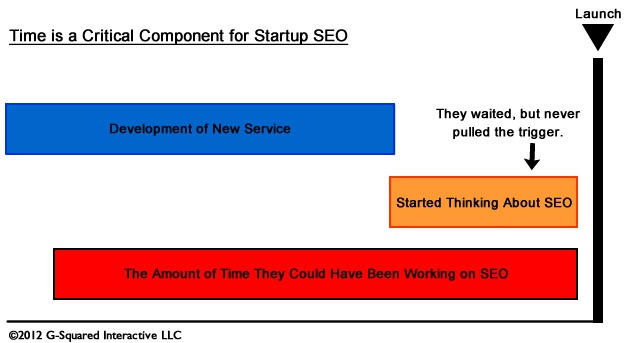
In addition, they thought some key PR efforts would expose the new service to the masses, and they believed that exposure would create massive amounts of interest and adoption. I explained to the founders that, although it could work, placing their eggs solely in the viral and PR baskets was a huge risk for their startup. The founders understood my concerns, but they wanted to move on until they “had enough revenue to invest in the marketing strategies I was advocating.” They definitely wanted to tackle SEO, but they felt like it could wait.
Hard Decision, Hard Results to Digest
Fast forward to today. I’ve kept an eye on their progress since I really enjoyed speaking with them, and I wanted to see how the launch went. The startup’s solution launched about four months ago, and the results seem weak, especially from a digital marketing standpoint. The website launched way too late, and it contains just a handful of unoptimized content (less than 25 pages). The site hasn’t built any links, and there are no links from relevant and powerful sites in their niche. They also have some great digital assets that are completely underused and unoptimized. They weren’t kidding when they said that SEO would wait.
Lack of SEO, Inbound Links, Shares, and Authority
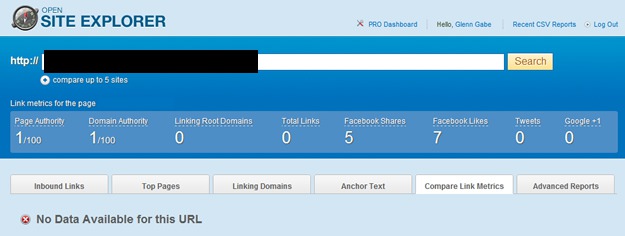
Their social efforts are non-existent. Literally, the accounts are claimed, but they are not being used. The site ranks for almost no target keywords, and traffic is very low (based on third-party, competitive intelligence tools I use). PR-wise, the startup has not been covered by the publications they thought would cover them. That obviously didn’t pan out for some reason.
Lack of Coverage Led to Lack of Exposure, Shares, and Traffic

But that’s not the worst part of this story. When you search for their brand name (yes, their brand name), their top competitor ranks number one in Google. Yes, #1. That’s due to the general nature of the brand name, lack of SEO, lack of exposure, lack of domain authority, etc. Talk about a slap in the face. If people hear about the product and search for it, they find the startup’s top competitor ranking number one in Google. And no, they aren’t running paid search either, which was also part of my initial strategy for them. They are four months in, and it’s like they don’t exist (at least digitally).
6 Key SEO Problems Your Startup Needs to Overcome
Needless to say, you don’t want this happening to your startup. When everything is on the line, including business results, founders’ reputations, investors’ trust, employees’ jobs, etc., you don’t want an anemic marketing plan killing your growth. It can lead to a quick death.
Based on my experience helping startups and witnessing examples like the one I listed above, I’d like to focus on some of the core mistakes that startups make when dealing with SEO. Note that this also applies to inbound marketing in general. I’ll explain each problem and then explain the benefits of addressing each issue in a different way. Let’s begin.
1. Searchlusions of Grandeur
Due to a lack of SEO understanding, some startups have crazy expectations about ranking for broad, head terms. For example, “We want every person searching for bags to find us all over Google.” Right, just “bags.” 🙂 I find that many startups don’t understand that SEO takes time to build, and that is only if their SEO plan is executed perfectly. Google will not jump you to the top of the rankings across hundreds, or thousands, of keywords in one month (or less). John Mueller from Google recently explained in a forum post that:
“…it can take a bit of time for search engines to catch up with your content, and to learn to treat it appropriately. It’s one thing to have a fantastic website, but search engines generally need a bit more to be able to confirm that, and to rank your site – your content – appropriately.”
Translation: No, you aren’t going to rank highly if you just launched your site, no matter how good it is.
If you work for a startup, you need to start building SEO strength well in advance of your launch. Don’t set up your domain name and website a few weeks before the launch and expect to rank well for target keywords. I understand you want to remain in stealth mode for as long as possible, but Googlebot doesn’t care about that. More on that next.
2. Stealth Mode SEO
Many startups are paranoid, some for good reason. When you come up with a new idea, and you are working day and night to bring that solution to market, you don’t want anyone knowing what you are working on. That’s why many startups remain in “stealth mode” until they launch. As I explained above, Google doesn’t have a special version of Googlebot that can crawl your unpublished content. Let’s face it, you can’t build links to a phantom website, you can’t build domain age without a domain, you can’t show off your thought leadership without a blog, etc. I understand you want to keep things under wraps until the final moment, but you will absolutely be killing your inbound marketing efforts, including SEO.
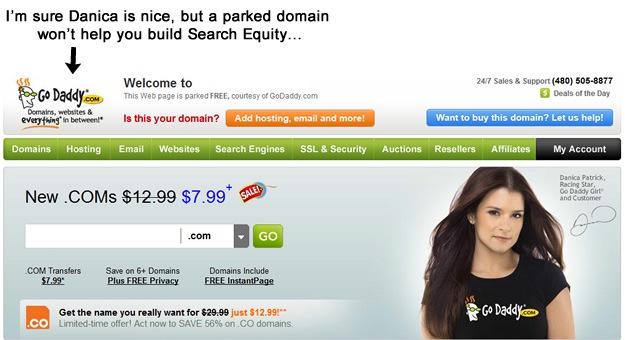
I always recommend getting a domain and a site up and running as soon as possible. You don’t need to explain your new product or service, but you can absolutely be building content and links. You can also set up and utilize your social accounts to build a targeted following, and then use that following to drive visits to your blog posts, research studies, white papers, etc. If you do this, then you might be able to launch with some SEO power. And that would be a very good thing. 🙂
3. The “Invested Every Dollar” Syndrome
This is where founders invest every dollar into the development of their product or service, and then they need to decide where to apply the remaining (dwindling) budget. Often, it’s too late to dedicate money to SEO or to inbound marketing in general. This leaves founders with tough decisions about how to fund startup marketing and how to get the most out of what’s left. It’s worth noting that this is often when poor SEO tactics creep in (cutting corners, chasing the algorithm, etc.). For example, “How can we get great SEO results in the fastest way possible?” That question could lead to domain issues, thin content, spammy links, or worse.
If you are launching a startup, you should absolutely budget in funds for SEO and inbound marketing. As many startups find out, you can build the best product or service in the world, but if consumers can’t find it, you’re dead in the water. I recommend speaking with a professional SEO or inbound marketer when you are just in the beginning stages of your startup. Understand the rough costs, budget those costs in, and start early. Again, launching with SEO strength could be a huge win and a big advantage for your startup.
4. Hiding Thought Leadership
Startups with amazingly smart and innovative people have the benefit of seeing the world in a unique way. Think about it. The founders saw a problem, developed a unique solution, and moved quickly to fill a void. This yields an unbelievable opportunity to tackle big issues publicly in blog posts, videos, podcasts, infographics, white papers, research studies, etc. This is a HUGE OPPORTUNITY that often goes untapped. Based on my experience with startups, it seems the core problems include the fear of losing smart people to the competition and the fear of losing stealth mode, which can lead to a clone popping up quickly.
I know it’s easy as an outsider to say this, but you cannot think this way. In a world where personal branding can yield incredible exposure and amazing results, you cannot keep thought leaders in a locked room. Start a blog focused on your niche. Write top-notch, thought leadership pieces. Use social media to build a following and to get the word out. This can give your launch a nice jumpstart by immediately getting your new product or service in front of a strong following. I’m not saying to reveal what you are doing before you launch, but you can absolutely write about your industry, key stories, emerging trends, provide deep analysis, etc.

5. Good PR Will Take Care of Everything
Many founders believe that getting covered by some top publications in their industry will lead to overnight success. Sure, getting covered by major publications in a certain niche is an important component to discovery, but it is not the end-all. Here’s a graph of the visits to a startup website after getting covered by an industry blog. Notice the spike and then the tailing off of traffic.
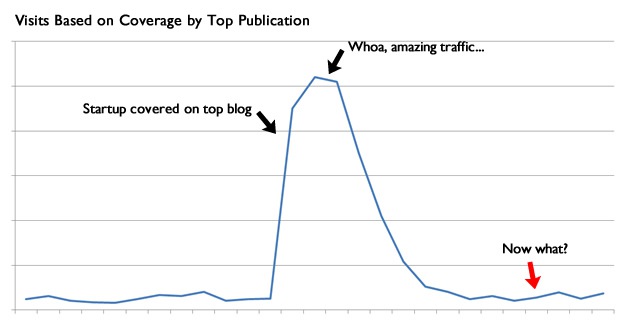
In my opinion, I believe it’s better to build up relationships over time, earn their respect, impress them with thought leadership pieces and research, and then reach out to them. Believe me, getting coverage will be much easier at that point. I don’t believe startups should put all their eggs in the PR basket. It’s also worth noting that seeding product with celebrities is smart, but it doesn’t replace a solid marketing strategy for your startup. Again, this could be part of your mix, but it should not be what you rely on for long-term success.
6. “Social” Will Be Taken Care of by Our Customers
A strong social strategy can help startups on several levels, including exposure, SEO, connecting with influencers, handling customer service issues, etc., but I’ve found many startups don’t invest in social at all. They set up their accounts, tweet out a few updates about their own products or services, and then let those accounts sit.
After speaking with a number of founders, I’ve learned that several falsely believe that as customers start using their products or services, those customers will immediately share their experiences on Facebook, Twitter, blogs, Google+, etc. That’s wishful thinking, especially if you aren’t there to help foster social communication. I often explain that startups should be continually driving great content, engaging users, finding influencers, etc. versus sitting back and waiting for the social wave of traffic to come. Unfortunately, that wave is often a ripple, and it cannot sustain your business.
“If you build it, they will come,” is more like: “If you build it, blog it, connect with it, and answer it, they will come.”
A Social Ghost Town: The Anemic Twitter Account of a Startup
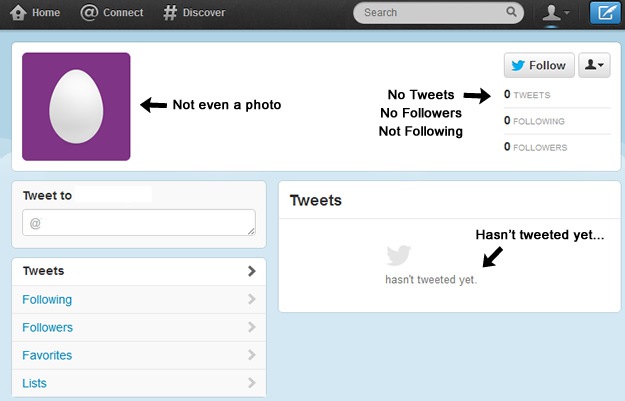
Summary – Startups Should Avoid “Startdown” SEO
Having run my own business for a number of years, I have great respect for startups. It’s incredibly challenging and risky to have an idea, build a solution, fund that solution, hire employees, deal with legal issues, fight off competitors, and try to succeed. The odds are definitely against you. That said, startups should definitely not brush off SEO or inbound marketing.
People are searching for solutions, and if you’re not there when they search, you can’t solve their problems. And that’s unfortunate when so much work goes into the first 95% of the business. But it’s that 5% that can boost your success. Startup SEO doesn’t have to be lonely, frustrating, and embarrassing. You’re in control. You just need to pull the trigger.
Image Credit:
bowie15 / iStockphoto
Lammeyer / iStockphoto




